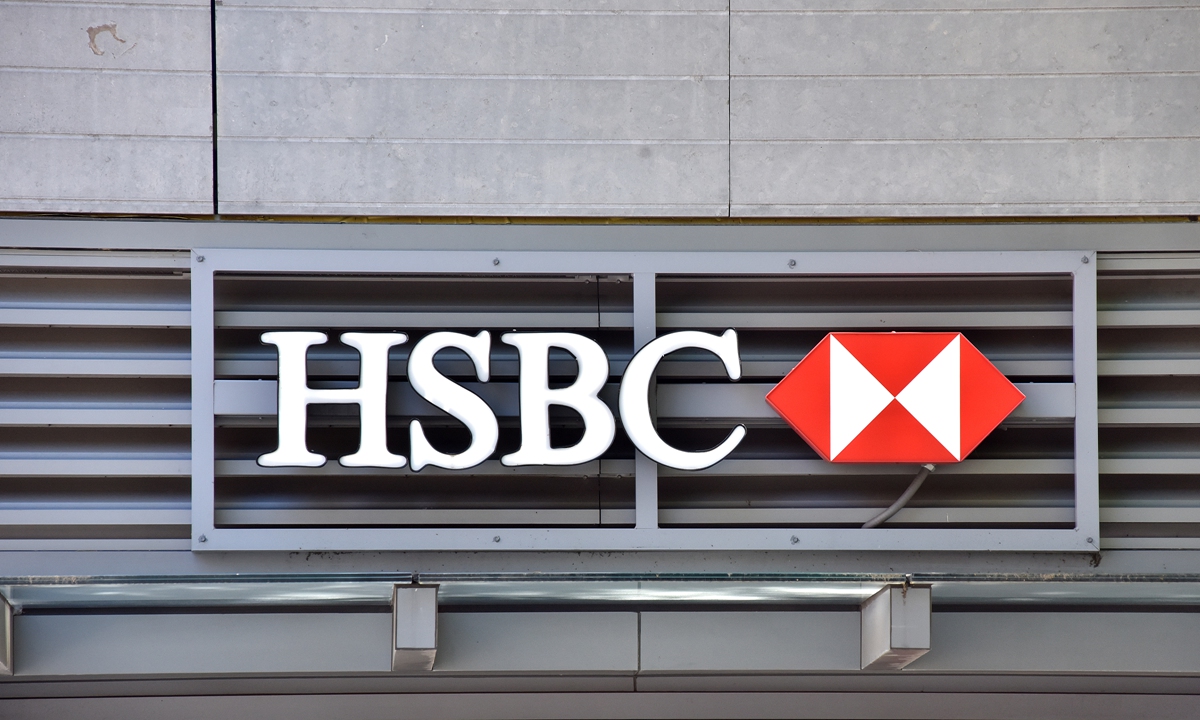HSBC profits plunges 69% in H1 2020
By GT staff reporters Source: Global Times Published: 2020/8/3 18:13:41
Business will continue shrinking as reputation can be ‘hardly’ restored: observers

File photo: HSBC Photo: VCG
London-headquartered HSBC, which generates most of its revenues from China market, saw its after-tax profits plunge 69 percent to $3.1 billion in the first half of 2020, amid its ongoing spat with Huawei and a series of reported misdeeds that have largely damaged its reputation among Chinese clients.
Analysts warned that the poor result is just the beginning of the "consequences" the firm will experience in the Chinese market, and said the worst-case scenario for the bank could be eviction from China. Some observers earlier warned that HSBC may face a dead end in Huawei's case.
During the first six months of the year, the lender's net operating income from Hong Kong totaled $8.7 billion, down 8 percent year-on-year. But that is still far higher than its $2.44 billion net operating income from the US market and $4.17 billion from the UK, reflecting the importance of the Hong Kong and the Chinese mainland markets.
The bank also revealed Monday that it has cut 4,000 jobs in the first half of 2020 and is on track to achieve its cost reduction goals. The number of employees has decreased by 8,300 in the past 12 months, its CFO said.
HSBC said its poor performance was mainly due to "the COVID-19 outbreak, geopolitical risk and market factors."
"We are implementing the 2020-2022 plan at pace; reducing costs and risk-weighted assets, and redeploying investment and capital into areas of faster growth and higher returns," said the bank.
The plunge in the British bank's profits not only reflect the common challenges of most multinational companies amid the pandemic, but also indicate that HSBC has begun seeing the consequences of its reported collusion with the US government in setting a political trap for Huawei, an observer who is closely following the case told the Global Times.
"The pandemic is one of the main reasons that have led to the plunge in the bank's revenues, but its recovery path will be tougher than those of its counterparts since it is very difficult for the Chinese market to accept it again after it 'sold Huawei out,'" industry analyst Xiang Ligang told the Global Times Monday.
In late July, Huawei provided evidence to a Canadian court showing how HSBC conspired with the US Department of Justice to set a "political trap" for Huawei and gave false testimony to the court, stimulating widespread blame for the bank among the mass Chinese public.
Netizens called Chinese authorities to conduct a "thorough investigation" on the firm's involvement in the Huawei case, and also urged the government to put it on the country's unreliable list.
HSBC is likely to continue seeing its business scale down in China, and fewer companies will "have the courage" to entrust it with their business given its controversial business record. Its business will only continue to shrink in the next half given its ruined reputation, Xiang said.
HSBC has been scaling back its operations in China.
In July, the Shenzhen office of the China Banking and Insurance Regulatory Commission granted HSBC's request to close its sub-branch in the city's Longgang district, which has a population of over 2 million, according to a circular from the local financial watchdog.
HSBC said in a statement that closure of the branch was "a part of ongoing network adjustment in response to changes of customer needs."
The lender previously confirmed with the Global Times that it would resume a restructuring plan to cut as many as 35,000 jobs in the medium term and freeze almost all external hiring.
Observers noted that this spelt a dead end for the bank's operations in China. "Given heavy operational pressure, HSBC may face even more layoffs in the coming months and could lose the huge Chinese market altogether," a Beijing-based observer who spoke on condition of anonymity told the Global Times.
The observer said the bank could be sued in Chinese courts and eventually pushed out of the market for its reported collusion with the US government.
So far this year, HSBC shares listed in Hong Kong and London have plunged more than 40 percent, according to Refinitiv data.
In the first quarter of 2020, the bank, also Europe's largest by assets, reported a 48 percent drop in its pre-tax profits, below an average analyst forecast of $3.67 billion compiled by HSBC.
Posted in: INDUSTRIES,ECONOMY,BIZ FOCUS